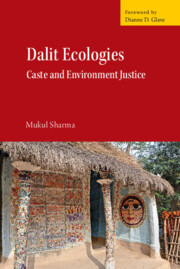Book contents
- Frontmatter
- Dedication
- Contents
- Foreword
- Acknowledgements
- 1 Introduction
- 2 Literature: ‘My World Is a Different World’ – Caste and Dalit Eco-Literary Traditions
- 3 Culture: ‘God of Humans’ – Dina–Bhadri, Dalit Folk Tales, and Environmental Movements
- 4 Rivers and Commons: Titash and Malos
- 5 Anthropocene: ‘Modern’ Chandigarh, Nek Chand, Rock Garden, and Dalitbahujan Anthropocenes
- 6 Industry: Caste of Labour, Dalits, Industrial Ecosystem, and Environmental Politics
- 7 Technology: Tanneries, Tanners, and Technological Injustices
- 8 Climate Change: Weather, Climate, Caste Economy, and Dalit Experiences
- 9 Caste and Race: Environment Justice and Intersections of Dalit–Black Ecologies
- Bibliography
- Index
9 - Caste and Race: Environment Justice and Intersections of Dalit–Black Ecologies
Published online by Cambridge University Press: 28 November 2024
- Frontmatter
- Dedication
- Contents
- Foreword
- Acknowledgements
- 1 Introduction
- 2 Literature: ‘My World Is a Different World’ – Caste and Dalit Eco-Literary Traditions
- 3 Culture: ‘God of Humans’ – Dina–Bhadri, Dalit Folk Tales, and Environmental Movements
- 4 Rivers and Commons: Titash and Malos
- 5 Anthropocene: ‘Modern’ Chandigarh, Nek Chand, Rock Garden, and Dalitbahujan Anthropocenes
- 6 Industry: Caste of Labour, Dalits, Industrial Ecosystem, and Environmental Politics
- 7 Technology: Tanneries, Tanners, and Technological Injustices
- 8 Climate Change: Weather, Climate, Caste Economy, and Dalit Experiences
- 9 Caste and Race: Environment Justice and Intersections of Dalit–Black Ecologies
- Bibliography
- Index
Summary
On 15 August 1973, the twenty-sixth anniversary of Indian Independence, Dalit Panthers, an organization founded by young Dalits in 1972 to evoke ideas of blackness and black power for representing Dalit politics, took out a march on Mumbai's streets. The march was called the Black Independence Day (Kala Swatantrya Din), where a Dalit Panthers Manifesto was released. Questioning the dominant narratives of independence, democracy, government, and political parties in India, the manifesto identified three ‘burning questions of Dalits today’: ‘1) food, clothing, shelter; 2) employment, land, untouchability; 3) social and physical injustice’. Key programmes, carried on under this manifesto, have extensively focused on Dalit access to natural resources: ‘The question of landlessness of the dalit peasants must be resolved’; ‘Dalits must be allowed to draw water from public wells’; ‘Dalits must live, not outside the village in a separate settlement, but in the village itself ‘; and ‘all means of production must belong to the Dalits’.
Political links between the Dalit Panthers and the Black Panthers, common legacies of B. R. Ambedkar and W. E. B. Du Bois, and numerous initiatives and academic writings by organizations, activists, and academicians have aligned anti-caste struggles of untouchables and low-caste people in India with anti-racist articulations of African Americans in the United States. Amid this long tradition of intersections between anti-casteist and anti-racist positions, Dalit–black solidarities have encompassed questions of social and economic inequalities, civil and political rights, possibilities of democracy, development, gender, empowerment, and formation of organizations of the oppressed. In history and economics, too, caste and race, Dalits and black people, and the parallel connections and common grounds between the two have been widely analysed. Caste and race have often been considered interchangeable, in terms of their overwhelming potential for damaging human society.
However, the age of civil and political rights for India's Dalits and America's black people is also a time of environmental inequalities and social and ecological movements in both communities and continents. Yet, the search for shared histories and struggles of Dalits and black people have not entered the unquiet world of environmental struggles.
Information
- Type
- Chapter
- Information
- Dalit EcologiesCaste and Environment Justice, pp. 214 - 241Publisher: Cambridge University PressPrint publication year: 2025
